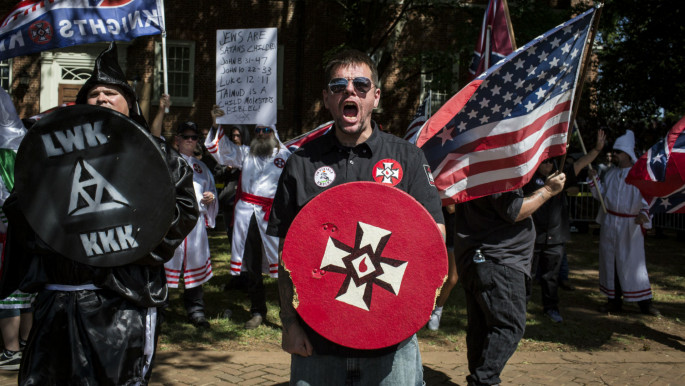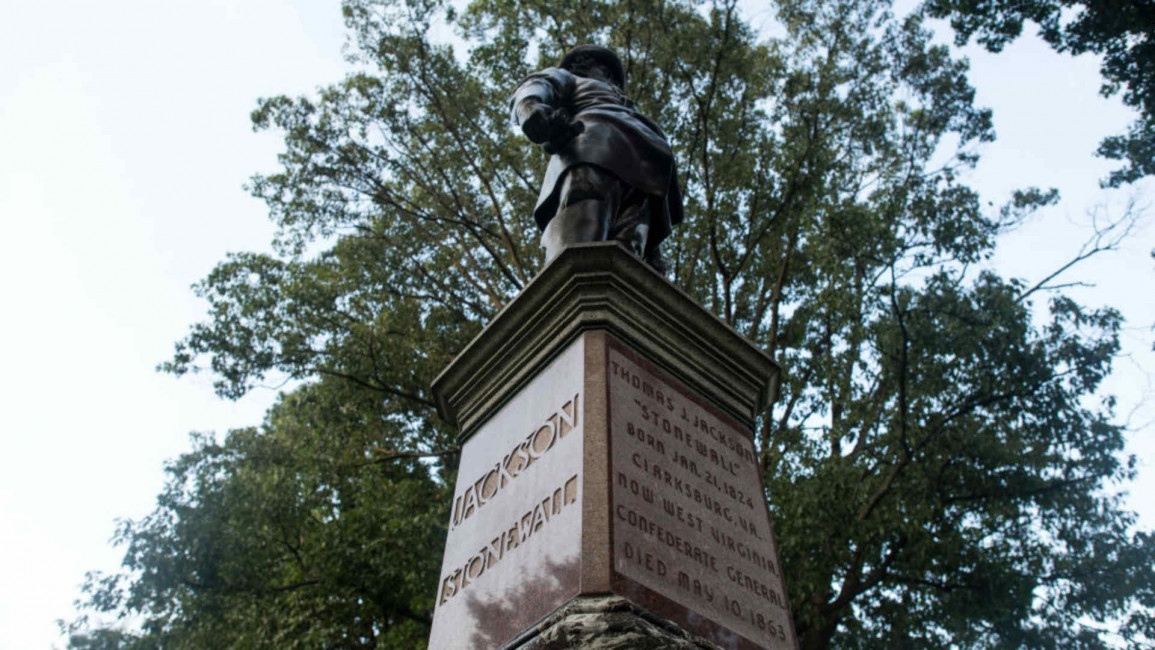
America's last true wake-up call
Those bulging eyes and the twisted mouth,
Scent of magnolias, sweet and fresh,
Then the sudden smell of burning flesh…
Powerful are the words that can lance through the myths of America, and powerful they must be. This land isn't everyone's land, and peace, justice and prosperity are not for all.
For 80 years Abel Meeropol's caustic words, sung mournfully by Billie Holliday and belted out by Nina Simone, rendered in full the horrors of slavery and the apartheid regime that followed, typically a minor footnote to the valiant deeds of courageous, white protagonists.
The idea of the Gallant Old South lives on today because, like so many American myths, it writes violence out of the picture entirely. Devotees of Robert E. Lee and Stonewall Jackson can laud their military tactics and chivalry with white peers only by ignoring the fact that they fought wholeheartedly to defend a country built around everlasting and institutionalised racial hierarchy, maintained by whip, gun, chain and noose.
The gaze of school history classes too often slides away from the South after covering the Civil War, ignoring the gradual abandonment of Southern blacks to the machinations of the same planter class that kept them in chains.
Likewise, the legalised segregation of Jim Crow too often comes across as a minor inconvenience rather than physical violence, psychological damage, and economic deprivation against broad swathes of people for the colour of their skin, a regime of fear that Meeropol put his finger on long before moneyed culture sought to spin it into entertainment, such as in the film, Selma.
 |
|
| The 'ethnic violence' we see overseas proudly calls the US home. [Getty] |
The white supremacist rally in Charlottesville and President Trump's unconscionable response threaten to reveal our present understanding of America to be yet more myths, easily unspun at the slightest provocation. The ethnic violence we decry overseas, supposedly rooted in unchanging cultures or underdeveloped minds, once more proudly calls the United States home.
In the wake of this, concerns over "civil war" are trending. Media outlets in the States tripped over themselves to ask experts, Could it happen here?
It is the wrong question. It has been happening here quietly, like a cancer thought dormant but metastasising, since 1865. Violence against the Other, the black, the immigrant, the Jew, what have you, was formally and informally codified in American domestic law, international policy and policing.
| Read more: Trump's condemnation of Charlottesville was too little too late | |
Whereas secret societies like the KKK were needed to save face for such abhorrent views in decades past, the internet has allowed for the maintenance and even advancement of racism, white nationalism and above all a vocabulary of ethnic violence in the open. Now, these views have a propaganda wing in Breitbart, a funding source in the Mercers, and a president in Donald Trump.
 |
Now, these views have a propaganda wing in Breitbart, a funding source in the Mercers, and a president in Donald Trump |  |
What has changed isn't the views, but their visibility. Too many of us in the United States found it easy to ignore the daily drumbeat of discrimination or deprivation when it played out subtle and slow through police departments, housing covenants, and voting restrictions. Now we are shocked that proponents of the status quo ante bellum would crawl into the light, asserting their worldview from the top-down.
That this would entail violence, in historical context, is obvious. Violence and the threat thereof are at the heart of the collective views of the American far-Right, and the primary means by which they exert agency throughout history.
Hence the knee-jerk excuses for any and all police action, "lone wolf" shooters, doxxing and death threats. Hence the Charlottesville copy of the Nuremburg Rally.
This isn't 1861. It isn't the 1960s or 1970s, either. Ours is a radically different society from the one even 10 years ago: Wealthier, yet more unequal; more intelligent, yet dumber; more connected, yet increasingly isolated. It stands to reason that the future of America in thrall to a Trump presidency will be wildly different than the nation's past.
The fundamental problem with centrist handwringers' arguments is that things are fine until they aren't. This is a Black Swan fallacy: Historical and statistical knowledge are only able to predict events that have happened before. What if the events to come are, to use a word lately made nauseating with overuse - unprecedented? We can't predict what we don't know is possible.
 |
Even under a sympathetic president and amid mass protests, we barely moved the dial on this subject as a country because far too many were willing to accept this as part of the course of daily life |  |
Part of this relies on our inability to grapple with the violence in our own country in public discourse, intent as our elites can be on drawing a line between normality at home and the insanity over there. In 2016, American police killed American citizens at a rate six times higher than in Canada and thirty times higher than in the United Kingdom.
Yet even under a sympathetic president and amid mass protests, we barely moved the dial on this subject as a country because far too many were willing to accept this as part of the course of daily life in the United States, unable to imagine how it could ever be different.
If anything, the last two years have illustrated the unplumbed depths of stupidity, malice and violence that humanity harbours. To ignore the possibility that, perhaps, we are not better than our forebears, and that novel avenues for failure, violence, disruption and chaos lay open, is akin to the student studying in the stacks while riots go on outside.
 |
The legalised segregation of Jim Crow too often comes across as a minor inconvenience rather than physical violence, psychological damage and economic deprivation |  |
It mistakes knowing our history for knowing ourselves, being book-smart for having the courage to face up to the enemies of the society we wish to build.
The sight of Klansmen, neo-Nazis, white supremacists and crusaders openly waving their banners of hate may be the last true wake-up call we get as a country. If we fail to see the violence inherent in the system that brought them forth, we risk lapsing into lazy acceptance of all that made "America is Already Great" a hollow and uninspiring counter-slogan.
To quote the Invisible Committee's The Coming Insurrection: "To go on waiting is madness. The catastrophe is not coming, it is here… It is within this reality that we must choose sides."
Andrew Leber is a PhD student in the department of government at Harvard University, and Nicholas Morley a researcher and graduate of Brown University. Follow Andrew on Twitter: @AndrewMLeber
Opinions expressed in this article remain those of the authors and do not necessarily represent those of The New Arab, al-Araby al-Jadeed, its editorial board or staff.




